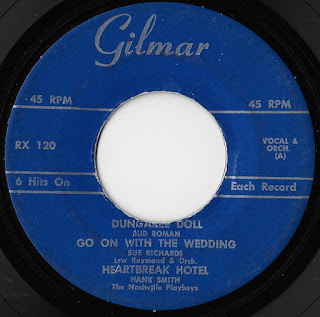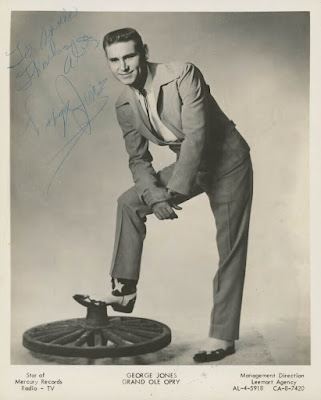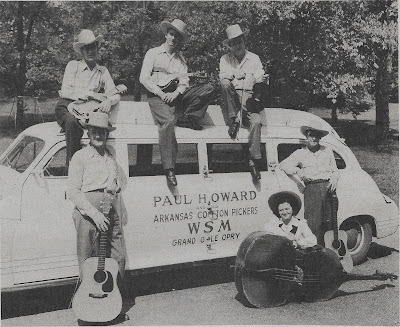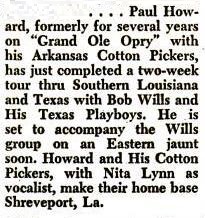 |
| The North La. Hayride, ca. 1960s Tom Ruple (drums), Brian Ritter (steel guitar), Governor Jimmie Davis (vocals), Coy Bohannon (guitar) |
Rural Entertainment in Louisiana
My record collecting friend from Southwest Arkansas, Mark Keith, has brought the spotlight to another local stage show. After he brought the Columbia County Hayride and the Arkansas Hayride to my attention, we now spotlight the North Louisiana Hayride (always spelled North La. Hayride) from Homer, Lousiana. Mark, who is also a multi-instrumentalist and still plays shows today, started playing the North La. Hayride in the late 1970s.
The show was started by musicians Coy Bohannon, Durwood Gathright, and Omar Volentine and its first show staged at the American Legion building in Homer in November 1962. By then, the original Louisiana Hayride from Shreveport, which is actually also located in the northwestern corner of Lousiana, had ended. For the North La. Hayride's first show, country music star Margie Singleton was brought in as a special guest. Singleton's aunt was living in Homer then and through her, the show's management was able to book Singleton.
The show featured music from a variety of acts every Saturday night. The first portion of the show featured the stage show, lasting for an hour to an hour and a half. After a break, during which the chairs were removed, a dance began which usually lasted until midnight. "There was no drinking, it was a family show," remembers Mark. "I only saw one fight there and it was people in their 70s - and it was wild," he adds with a grin.
 |
| Carl Lowe on stage |
Regulars and guest artists throughout the early years included Bill Bohannon, Ray Langston, Ginger Kelley, Ray Frushay, Gene Wyatt (of "Lover Boy" fame), Joe Stampley (drawing a crowd of approxiamtely 1,200 people), and Johnny Russell . Performers during later years included Jackie Martin, Cathy Denmon, Benny Shelton and the Shelton family, Angela Allen, Ken Lewis, among others. Regarding Johnny Russell's appearance on the show, Mark recalls: "Years ago, I interviewed Johnny Russell and I asked him if he remembered playing it [the North La. Hayride]. He said he sure did. He said the guy that booked him, 'Dearwood Gaythright' (that's how he pronounced it) told him 'now nobody will come in until I go out and sing a couple of songs'. Russell said there was virtually no one inside but Durwood sang and people poured in!"
 |
| Larry Monzingo, Billy Lowe, and Coy Bohannon on stage |
In 1972, local entrepreneur Dooley Peterson decided to built a hall for the North La. Hayride and rented it out to the show's management. Deloach retired from managing the show in the early or mid 1980s, a few years prior to his passing, and Coy Bohannon left in 1986 or early 1987, leaving Durwood Gathright as the sole manager of the show. He operated it during the show's last ten years of existence.
• Thanks to Mark Keith for sharing his memories, information and photo material for this post.





















